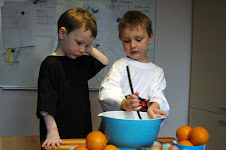
Dont'cry, it is much easier than you think. No matter how many different recipes go under the label "true Italian cuisine", there is a basic philosophy all Italians follow when cooking.
It is calling something Italian that causes the main problem. You should know that in Italy only there are at least 22 recognised regional cooking styles. Besides, every village, every family, every single cook in a family have their own peculiar style and recipes. So, where do we start?
Let's start by the ingredients:
Preferably those produced locally. Trust your senses; look at them, smell them, touch them and possibly taste them. If you are convinced, buy them and let's get started.


(You shouldn't forget to get the package open).
Oh, yes, most important: all famous Italian cooks claim the learnt everything by watching their mom cooking. You can do the same in this course, Elianto and Luca don't mind you joining in the kitchen.
You might be used at measuring in cups, or grams or liters, by volume or by weight. I really prefer the eye, except for baking or other fine-tuned recipies.
As the Italian saying goes: if you want to bake an omelette, you need first to break the eggs. So don't be afraid of just trying things, following your common sense as well as your other senses, and trusting your judgments.
After you put together all the ingredients, you can get started. It might surprise you, or you don't know anything better, but buying the best ingredients take lots of time. The actual cooking goes much faster, if you get good stuff.
When I am in Ofena, I usually go on Thursdays at the market in Popoli, where they also have a farmer market.
My other favourite market in the area is the daily one at Piazza Duomo, in l'Aquila.
My other favourite market in the area is the daily one at Piazza Duomo, in l'Aquila.
No recipe is engraved in marble for posterity to follow it. You are free to add or change ingredients, add your own touch and create your own version of a recipe.
What I do during the course is to give you some basic guidelines.
After you trust your basics, I encourage you to experiment, to check things on your own, to discuss alternatives together.


If you are not convinced, or just want to check, you should always taste it. I once had a student that wanted at all costs to subsitute the oranges in an orange and fennel salad, because she had a friend who made a grapefruit salad.
I thought it wasn't a good idea and told her so, but she was very assertive, so I let her go her own way, and helped other students instead. The salad turn out to be horrible, I kept my mouth shut, and the rest of the course went wonderfully, wth lots of experimenting and good food.
I thought it wasn't a good idea and told her so, but she was very assertive, so I let her go her own way, and helped other students instead. The salad turn out to be horrible, I kept my mouth shut, and the rest of the course went wonderfully, wth lots of experimenting and good food.
This is to say, I might be the mamma in the course, I am not going to make you eat whatever you made against my judgement. Because this way we all might find out wonderful combinations.
The nicest thing about cooking together as a group is that there is always someone to help. And I am there all the time to get you there. The process to me is as important as the results.


Because that's the spirit: we cook together, we eat together, we share food with others. That's really one of the basics in Italy.
That one person does all the work and another does all the eating is not really the idea. So, don't say I did not tell you that.
And when we are done, we all help cleaning up.
I hope you got a better idea of how I like a cooking course to go: we have lots of fun together, we are free to experiment, we try all sort of different recupes, techniques and ingredients, but most of all: we enjoy food.
Food preparation and eating. It is the most basic form of art, everybody can enjoy it.













